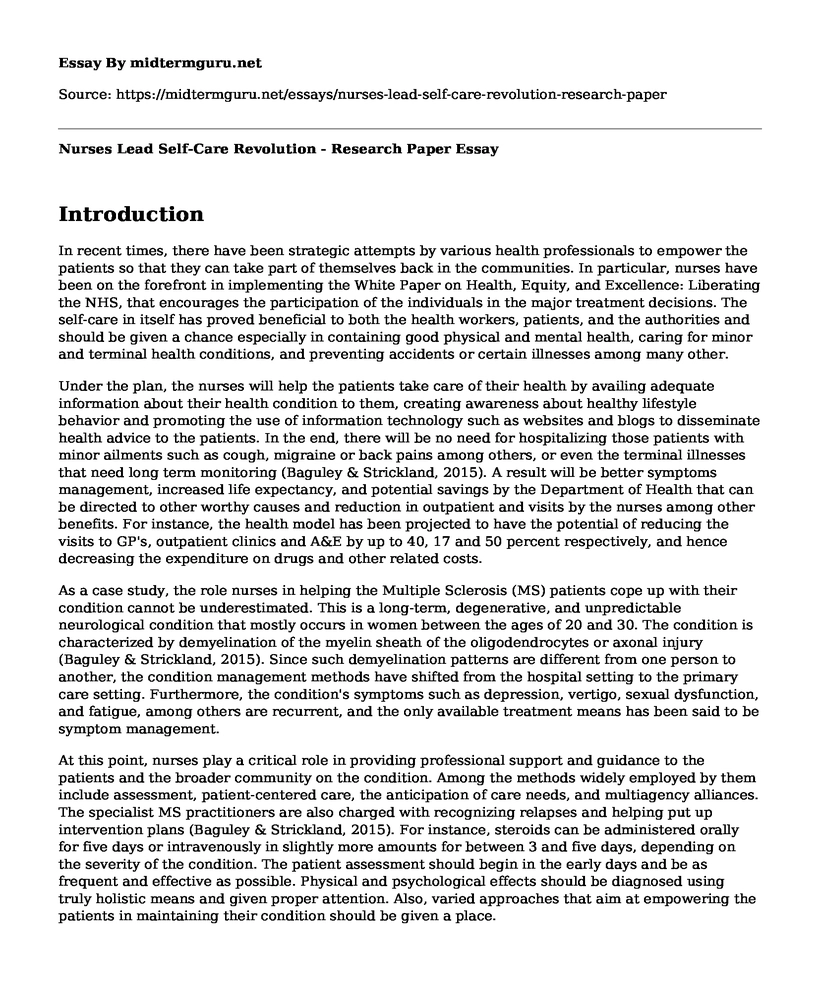Introduction
In recent times, there have been strategic attempts by various health professionals to empower the patients so that they can take part of themselves back in the communities. In particular, nurses have been on the forefront in implementing the White Paper on Health, Equity, and Excellence: Liberating the NHS, that encourages the participation of the individuals in the major treatment decisions. The self-care in itself has proved beneficial to both the health workers, patients, and the authorities and should be given a chance especially in containing good physical and mental health, caring for minor and terminal health conditions, and preventing accidents or certain illnesses among many other.
Under the plan, the nurses will help the patients take care of their health by availing adequate information about their health condition to them, creating awareness about healthy lifestyle behavior and promoting the use of information technology such as websites and blogs to disseminate health advice to the patients. In the end, there will be no need for hospitalizing those patients with minor ailments such as cough, migraine or back pains among others, or even the terminal illnesses that need long term monitoring (Baguley & Strickland, 2015). A result will be better symptoms management, increased life expectancy, and potential savings by the Department of Health that can be directed to other worthy causes and reduction in outpatient and visits by the nurses among other benefits. For instance, the health model has been projected to have the potential of reducing the visits to GP's, outpatient clinics and A&E by up to 40, 17 and 50 percent respectively, and hence decreasing the expenditure on drugs and other related costs.
As a case study, the role nurses in helping the Multiple Sclerosis (MS) patients cope up with their condition cannot be underestimated. This is a long-term, degenerative, and unpredictable neurological condition that mostly occurs in women between the ages of 20 and 30. The condition is characterized by demyelination of the myelin sheath of the oligodendrocytes or axonal injury (Baguley & Strickland, 2015). Since such demyelination patterns are different from one person to another, the condition management methods have shifted from the hospital setting to the primary care setting. Furthermore, the condition's symptoms such as depression, vertigo, sexual dysfunction, and fatigue, among others are recurrent, and the only available treatment means has been said to be symptom management.
At this point, nurses play a critical role in providing professional support and guidance to the patients and the broader community on the condition. Among the methods widely employed by them include assessment, patient-centered care, the anticipation of care needs, and multiagency alliances. The specialist MS practitioners are also charged with recognizing relapses and helping put up intervention plans (Baguley & Strickland, 2015). For instance, steroids can be administered orally for five days or intravenously in slightly more amounts for between 3 and five days, depending on the severity of the condition. The patient assessment should begin in the early days and be as frequent and effective as possible. Physical and psychological effects should be diagnosed using truly holistic means and given proper attention. Also, varied approaches that aim at empowering the patients in maintaining their condition should be given a place.
Conclusion
In summary, to test the effectiveness of the self - based care program, measures should be put in place to measure the performance of a particular nurse. Such include the changing of roles and career assessment. While changing of roles is healthy for the patient-nurse relationships, continuous assessment is equally important as it helps discover areas of shortcomings and strengths in the self-based care model. Ultimately, more skills for the anticipation of care needs as well as additional multiagency collaboration can be adopted.
Reference
Baguley, F. & Strickland, K. (2015). The Role of the Community Nurse in Care Provision for People with Multiple Sclerosis.
Cite this page
Nurses Lead Self-Care Revolution - Research Paper. (2023, Jan 24). Retrieved from https://midtermguru.com/essays/nurses-lead-self-care-revolution-research-paper
If you are the original author of this essay and no longer wish to have it published on the midtermguru.com website, please click below to request its removal:
- Essay on the Issue of Abortion
- Paper Example on Healthcare Insurance Policy Issues: Affordable Care Act
- BRCA1/2 Mutation In High-Risk Breast/Ovarian Cancer - Article Analysis Essay
- Research Paper on Bipolar Disorder
- Euthanasia: A Delicate Way to End Suffering and Pain - Research Paper
- Reducing Cardiovascular Disease: The American Heart Association - Essay Sample
- Literary Analysis Essay on "Their Eyes Were Watching God"







